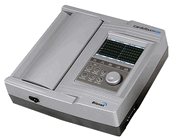Need Help? Call Toll FREE
1-888-822 3336
getMedOnline Posting Page
Wednesday, September 4, 2013
Electrocardiography, often abbreviated as ‘EKG’, refers to a special scientific discipline regarding the electric activity of the heart, specifically regarding heart rate. There is an area of the heart responsible for emitting these small electric signals, and the cells are affectionately referred to as ‘pacemaker cells’. Often, when someone is a cardiovascular crisis, the most effective and quick method to gauge their cardiovascular health is through running an electrocardiogram, which provides a readout of how intense and regular these signals to the heart are. With advances in technology, many EKG machines can not only detect irregular heartbeats, but also heart chamber health and any number of other interpretive measures. One such device is the Bionet Cardiocare 2000 Interpretive EKG, which can utilize over 80 different algorithmic programs to analyze a patient’s cardiovascular health.
Generally, running an EKG is a quick and painless affair. Using external electrodes which are placed on various areas of the body, there is no invasive procedure to worry about and very little maintenance cost as a result of running an EKG. The diagnostic ability provided by an EKG unit is also worth applauding, as a properly run EKG allows for detection of abnormal heart rhythms, problems with the closing or opening of heart valves, detection of damage to specific areas of the heart, and much more based on the abilities and functionality of the machine. In the case of the Bionet Cardiocare 2000 Interpretive EKG, not only does the EKG unit provide a digital readout of heart rate and battery life, but it also allows for entering of patient data such as height, weight, and age to aid in its calculations and algorithms. As if that wasn’t enough functionality, it also has an on-board printer to record patient readouts of vitals for quick record-filing and immediate analysis.
Although the apparent benefits of electrocardiography may make EKGs sound like a necessary test at every checkup, it’s always important to remember that, more often than not, they should only be performed when symptoms of cardiovascular dysfunction are noted. This is due to the fact that incorrect diagnoses of non-existent heart issues tend to be higher when EKGs are performed without noticeable symptoms present. Often, any irregularity that an EKG might note can be attributed to a condition that is either not present or doesn’t require any present action. For this reason, and to keep healthcare costs low, it is only recommended that doctors perform an EKG when there justifiable cause for concern.
by: getMedOnline
Generally, running an EKG is a quick and painless affair. Using external electrodes which are placed on various areas of the body, there is no invasive procedure to worry about and very little maintenance cost as a result of running an EKG. The diagnostic ability provided by an EKG unit is also worth applauding, as a properly run EKG allows for detection of abnormal heart rhythms, problems with the closing or opening of heart valves, detection of damage to specific areas of the heart, and much more based on the abilities and functionality of the machine. In the case of the Bionet Cardiocare 2000 Interpretive EKG, not only does the EKG unit provide a digital readout of heart rate and battery life, but it also allows for entering of patient data such as height, weight, and age to aid in its calculations and algorithms. As if that wasn’t enough functionality, it also has an on-board printer to record patient readouts of vitals for quick record-filing and immediate analysis.
Although the apparent benefits of electrocardiography may make EKGs sound like a necessary test at every checkup, it’s always important to remember that, more often than not, they should only be performed when symptoms of cardiovascular dysfunction are noted. This is due to the fact that incorrect diagnoses of non-existent heart issues tend to be higher when EKGs are performed without noticeable symptoms present. Often, any irregularity that an EKG might note can be attributed to a condition that is either not present or doesn’t require any present action. For this reason, and to keep healthcare costs low, it is only recommended that doctors perform an EKG when there justifiable cause for concern.
by: getMedOnline









0 Comments :
Post a Comment
Subscribe to Post Comments [Atom]